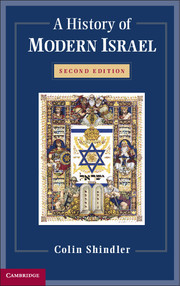Book contents
- Frontmatter
- Contents
- Illustrations
- Maps
- Acknowledgements
- Glossaries
- Chronology
- Preface to the second edition: Towards 2020
- Introduction
- 1 Zionism and security
- 2 The Hebrew Republic
- 3 New immigrants and first elections
- 4 The politics of piety
- 5 Retaliation or self-restraint
- 6 The Rise of The Right
- 7 The Road to Beirut
- 8 Dissent at Home and Abroad
- 9 An insurrection before a handshake
- 10 The end of ideology?
- 11 The Killing of a Prime Minister
- 12 The Magician and the Bulldozer
- 13 ‘He does not stop at the red light’
- 14 An unlikely grandfather
- 15 A Brotherly Conflict
- 16 Bialik's bequest?
- 17 Stagnation and Isolationism
- 18 An Arab Spring and an Israeli winter?
- Bibliography
- Index
- References
1 - Zionism and security
Published online by Cambridge University Press: 05 March 2013
- Frontmatter
- Contents
- Illustrations
- Maps
- Acknowledgements
- Glossaries
- Chronology
- Preface to the second edition: Towards 2020
- Introduction
- 1 Zionism and security
- 2 The Hebrew Republic
- 3 New immigrants and first elections
- 4 The politics of piety
- 5 Retaliation or self-restraint
- 6 The Rise of The Right
- 7 The Road to Beirut
- 8 Dissent at Home and Abroad
- 9 An insurrection before a handshake
- 10 The end of ideology?
- 11 The Killing of a Prime Minister
- 12 The Magician and the Bulldozer
- 13 ‘He does not stop at the red light’
- 14 An unlikely grandfather
- 15 A Brotherly Conflict
- 16 Bialik's bequest?
- 17 Stagnation and Isolationism
- 18 An Arab Spring and an Israeli winter?
- Bibliography
- Index
- References
Summary
Zionism Beyond Demonization
The course of Israel's history since the state's establishment in 1948 has been determined by two central factors, the guiding influence of a specific Zionist ideology and the need for security.
A central aim of Zionism was to safeguard the existence of the Jewish people from physical extinction and persecution on the one hand, and assimilation and disintegration on the other. The establishment of a state of Israel in the Land of Israel in 1948 was the most prominent realization of Zionism. A probable majority of the world's Jews identify with Israel as a spiritual centre – unlike any other diaspora and their mother country. Still others would argue that Zionism was more than the transient desire for a state; it was the ideal to build a perfect society.
Today, however, Zionism is often depicted in pejorative and satanic terms, as an appendage of imperialism and an offshoot of colonialism. Just as the Jews historically proved difficult to fit into political and theological theory, the uniqueness of Zionist ideology has meant that it is often easier to demonize it. The fog of the propaganda war surrounding the tortuous Israel–Palestine conflict has also aided in the intellectual burial of Zionism. Yet before 1948, it attracted the support, not only of large numbers of Jews, but also of the progressive intelligentsia. Bertrand Russell, Jean-Paul Sartre and Aneurin Bevan all embraced the Zionist cause, not simply as a haven for the persecuted, but because a state for the Jews offered the prospect of building a new society, free from Europe’s flaws. Even Trotsky in Mexican exile expressed interest in the Yishuv, the Jewish settlements in Palestine. His biographer Isaac Deutscher admitted his regret that he had not urged Jews to leave for Palestine because ‘I might have saved some of the lives that were later extinguished in Hitler’s gas chambers’. The Zeitgeist of postwar Europe led the international Left to strongly endorse the right of the Jews to national self-determination in Palestine. The establishment of the state of Israel in 1948 was partly understood as an act of affirmative action.
- Type
- Chapter
- Information
- A History of Modern Israel , pp. 10 - 37Publisher: Cambridge University PressPrint publication year: 2013



